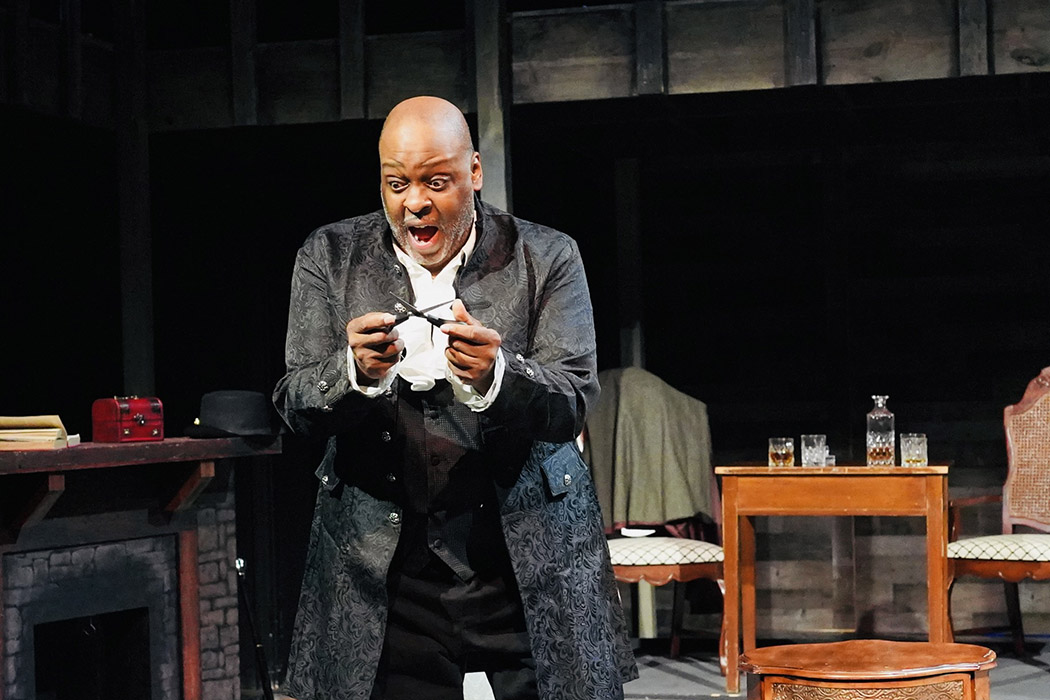The occasion of a new opera making its world premiere carries not only an elevated interest for opera-goers, but also an elevated excitement. That was certainly the case last weekend as Marble City Opera premiered The Doctor and the Devils, a work it had commissioned from Knoxville composer Jason Overall. The opera was staged by MCO Executive Artistic Director Kathryn Frady with the company returning to the Old City Performing Arts Center following previous productions there of The Infinite Energy of Ada Lovelace in 2023 and Heartbreak Express in 2022.
The Doctor and the Devils, though, carried several firsts. The marvelously addictive and atmospheric score was Overall’s first in the operatic genre, although he has a substantial catalog of music in other categories of choral and chamber music. And, the libretto was drawn from an un-produced screenplay of the same name by Welsh poet, Dylan Thomas, giving its credentials a bit of literary oomph. Thomas based his story on true events in Edinburgh, Scotland, in the 19th Century, in which an anatomist, one Dr. Robert Knox, looked the other way when cadavers were provided to him that were the product of murder, rather than natural death.
Admittedly, one can feel the intended cinematic nature in the libretto, a nature that cannot escape the structure and rhythm of multiple scenes that depend in a theatrical setting on lighting and separate stage areas to sell the different locales. Nevertheless, the pacing and flow carry the audience along not unlike a train making local stops on a curious journey.
That journey is also supported by Overall’s score that not only provides the eight-member cast with distinct vocal characters, but sets a descriptive mood, tone, and pacing through the orchestration that is as charming as it is contemporary.

Overall followed through with Thomas’ renaming of the real life characters: Robert Knox became Thomas Rock (baritone Stephen Salters) with an assistant Murray (tenor Cody Boling); the murderous body-snatchers of Burke and Hare were changed to Fallon (Daniel Webb) and Broom (John Overholt). Rock’s wife, Elizabeth, was sung by Lela Philbrook; Rock’s sister, Annabella, by Ema Mitrovic; barmaids Jenny and Alice by Jenna Zicardi and Gianna Grigalonis, respectively.
This cast of The Doctor and the Devils was uniformly strong, both vocally and dramatically. Salters, a new voice faculty member at the University of Tennessee College of Music, was brilliant as Dr. Rock. His characterization of Rock was bold, painting it with a rich and demonstrative vocal portrayal that benefited from his amazing diction.

Several singers were making return visits to Marble City Opera. Cody Boling, impressive in last season’s Susannah as Little Bat, was fabulous here in elevating the role of Murray into a unique character, thanks to his amazingly extended range that added an expansive landscape of tragedy to what otherwise exists in the role. Jenna Zicardi’s Jenny, the working-girl/barmaid and Murray’s object of affection, was the perfect balance of romance and real-world struggles. The pair of Boling and Zicardi made the sweetly melodic love duet in Act I a standout moment even if it was something of a stylistic departure. Mezzo-soprano Ema Mitrovic, also returning from last season’s Susannah, was Annabella, in many ways representing in the abstract the prevailing views of society.
Daniel Webb brought his wide theatrical experience to the complex character of Fallon, an obviously conflicted personality who was besieged by a dozen different devils. John Overholt’s character of Broom, also deliciously conflicted, was perfectly willing to betray his partner in crime. Mezzo-soprano Gianna Grigalonis made the small role of Jenny’s friend, Alice, into a significant secondary character.

The importance of new works in the chamber opera world, like The Doctor and the Devils, cannot be overstated. Marble City Opera exists to bring chamber opera to life both figuratively, and in this case, literally. Its message from Dr. Rock, too, can be found in all aspects of our own lives: do the ends justify the means?





